

Attention word nerds: 13 mysteries of the vernacular, solved. Science Five videos that make particle physics child’s play: Physicists from CERN team up with TED-Ed Particle physics.
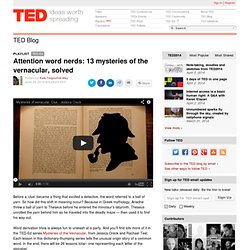
To some, the words may produce anxiety. The Five Types of Names (or, Why Suggestive Beats Descriptive) To the average civilian, the concept of name taxonomies or categories is vague at best.

Unless you’re a naming professional, you probably think of corporate and product names as short or long, trendy or stale, available as an Internet domain or not. And that’s about it. Those categories are more or less irrelevant in the eyes of the U.S. Patent and Trademark Office (USPTO), which classifies names according to a spectrum of distinctiveness. “Distinctive” has a specific legal meaning here: the more distinctive a name, the greater its potential for legal protection in the form of trademark. The spectrum of distinctiveness runs from generic on one end to fanciful on the other. Knowing about trademark distinctiveness and types of names can help you become a smarter judge of business names—your own and others’.
Generic names identify an entire class of products or services; they are the weakest of all names and cannot be granted trademark protection. Rectification of names. The Rectification of Names (Chinese: 正名; pinyin: Zhèngmíng; Wade–Giles: Cheng-ming) is the Confucian doctrine that to know and use the proper designations of things in the web of relationships that creates meaning, a community, and then behaving accordingly so as to ensure social harmony is The Good.[1] Since social harmony is of utmost importance, without the proper rectification of names, society would essentially crumble and "undertakings [would] not [be] completed.
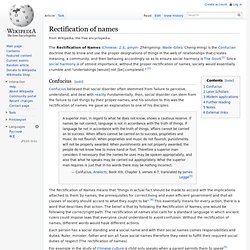
" [2] Confucius[edit] Confucius believed that social disorder often stemmed from failure to perceive, understand, and deal with reality. Auto-antonym. In English, "inflammable" is an auto-antonym which can mean either "combustible" or "noncombustible"[1] so English safety labels typically use "Flammable".
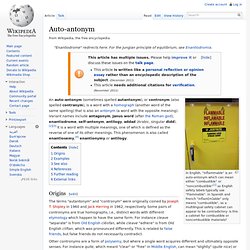
In Spanish and French "inflam[m]able" only means "combustible", so a multilingual safety cabinet can appear to be contradictory- is this a cabinet for combustible or noncombustible materials? An auto-antonym (sometimes spelled autantonym), or contronym (also spelled contranym), is a word with a homograph (another word of the same spelling) that is also an antonym (a word with the opposite meaning).
Variant names include antagonym, Janus word (after the Roman god), enantiodrome, self-antonym, antilogy, addad (Arabic, singular didd).[2][3] It is a word with multiple meanings, one of which is defined as the reverse of one of its other meanings. This phenomenon is also called enantiosemy,[4] enantionymy or antilogy. Origins[edit] The terms "autantonym" and "contronym" were originally coined by Joseph T. Examples[edit] Cephalophore. The term "cephalophore" was first used in a French article by Marcel Hébert, "Les martyrs céphalophores Euchaire, Elophe et Libaire", in Revue de l'Université de Bruxelles, v. 19 (1914).
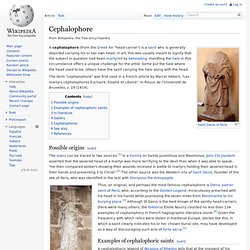
Possible origins[edit] The topos can be traced to two sources.[1] In a homily on Saints Juventinus and Maximinus, John Chrysostom asserted that the severed head of a martyr was more terrifying to the devil than when it was able to speak. "He then compared soldiers showing their wounds received in battle to martyrs holding their severed head in their hands and presenting it to Christ".[2] The other source was the Western vita of Saint Denis, founder of the see of Paris, who was identified in the text with Dionysius the Areopagite.
Saint Denis. Engine: The History of a Concept, From 14th-Century Poetry to Google - Rebecca J. Rosen. We think of "engine" as a mechanical device, but the word has roots that go way further back, and illuminate some of its newer meanings.

Engines may be a relatively recent invention, but "engine" the word has been around for quite some time. Here, for example, is the poet John Gower using the word to describe women in the 14th century (emphasis added): The craft Minerve of wolle fond And made cloth hire oghne hond; And Delbora made it of lyn: Tho wommen were of great engyn. Meaning, roughly (thanks to scholar Karl Steel for the assist with this):
Meet the Tireless Maestro of Etymology, Gerald Leonard Cohen. Out in the wilds of western Missouri, in Rolla, which is not far from the tornado-devastated town of Joplin, lives a scholar who has made etymology his life’s work.
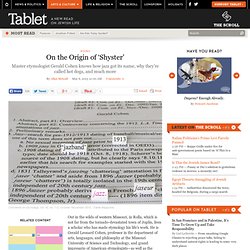
He is Gerald Leonard Cohen, professor in the department of arts, languages, and philosophy at the Missouri University of Science and Technology, and grand impresario of American etymologists—as well as the world’s leading corraler of language historians, who often join him in tackling some of the most challenging puzzles of word origins. Cohen does this through his unique self-published journal, Comments on Etymology. For more than four decades this journal has brought etymologists worldwide together in its pages, searching for the origins of everything from shyster to the Big Apple, from hot dog to hamentaschen, from gung ho to jazz.
The Always Amusing Euphemism Generator. The rise of the asshole: Lexicon Valley talks with linguist Geoffrey Nunberg. Listen to Lexicon Valley Episode No. 17: Ascent of the A-Word: According to linguist Geoffrey Nunberg: “There have been eras that took a far more intense interest in spectacles of cruelty than ours, but none that was so transfixed by watching people act like assholes.”

On “Geek” Versus “Nerd” To many people, “geek” and “nerd” are synonyms, but in fact they are a little different.

Consider the phrase “sports geek” — an occasional substitute for “jock” and perhaps the arch-rival of a “nerd” in high-school folklore. If “geek” and “nerd” are synonyms, then “sports geek” might be an oxymoron. Wordia - help students to learn subject vocabulary through free learning games and video. VocabGrabber. A Collection of Word Oddities and Trivia. The Phrontistery: Obscure Words and Vocabulary Resources. 11 Untranslatable Words From Other Cultures. Wordnik: All the Words. Ambiguous Words. Reverse Dictionary.
<div id="needs_javascript"><center><b>Note: OneLook Thesaurus requires JavaScript.

</b><br /><img src="/img/a.gif? Q=omg_a_user_without_js"> If you have disabled JavaScript in your browser, please <a href=" it for this site</a> or use the <a href="/? W=entersearchhere&loc=revfp_legacy">old version of the reverse dictionary</a> here. </p><p></center><div> How do I use OneLook's thesaurus / reverse dictionary? This tool lets you describe a concept and get back a list of words and phrases related to that concept. What are some examples? What are patterns? I'm only looking for synonyms! For some kinds of searches only the first result or the first few results are likely to be useful.
Filters Your search can be refined in various ways using the filters that appear in the "Filter by... " menu on the results page. How does it work? The reverse dictionary uses a souped-up version of our Datamuse API, which in turn uses several lingustic resources described in the "Data sources" section on that page. Grandiloquent Dictionary. This is the result of an ongoing project to collect and distribute the most obscure and rare words in the English language. It also contains a few words which do not have equivalent words in English. At present, the dictionary contains approximately 2700 words, though it is constantly growing. The Dictionary of Obscure Sorrows. Tangier, Virginia. Tangier, Virginia is a town in Accomack County, Virginia, United States, on Tangier Island in Chesapeake Bay.
The population was 727 at the 2010 census.[3] The majority of the original settlers were from South West England,[4] and the tiny island community has attracted the attention of linguists because its people speak a unique English Restoration-era dialect of American English. History[edit] Prior to the arrival of European colonists on Tangier Island, it was a summer retreat for the Pocomoke Indians[5] for centuries.
Although not much is known about these people, their existence is evidenced by the thousands of stone arrowheads that have been found all over the island. The Persistence of English (Nunberg) The Word Detective. Word Information - an English dictionary about English vocabulary words and etymologies derived primarily from Latin and Greek word origins. Farm Pop: Why Being a 'Black Sheep' Is a Bad Thing and Other Ag-Idioms Explained. Get your goat. High on the hog. The black sheep of the family.
We toss these sayings around with ease, even though, taken out of context, they seem nonsensical. After all, why is someone annoying you equated with having one’s goat taken away? 10x10 / 100 Words and Pictures that Define the Time / by Jonathan J. Harris. 5 Insane Ways Words Can Control Your Mind. On some level we already know that language shapes the way we think. We're automatically more afraid to fight a guy named Jack Savage than somebody named Peewee Nipplepuss, even if we've never seen either of them before. It's totally illogical, but you probably run into an example of that every day, and don't notice it.
While we tend to think words are just sounds we make to express ideas, science is finding that language is more like a fun house mirror, warping what we see in mind-blowing ways. For instance ... Speaking English Makes Us More Likely to Blame People Let's say your roommate Steve is jumping on your bed. How will you answer? Keep in mind, Steve pulls this shit all the time. The answer largely depends on what language you speak. Txt Msg N English Language Literacy by Maryam Tayebinik, Marlia Puteh. Maryam Tayebinik Universiti Teknologi Malaysia Marlia Puteh Universiti Teknologi MalaysiaNovember 11, 2012. Internet Anagram Server / I, Rearrangement Servant : anagram, anagrams, nag a ram, software, anagramme, anagrama, wordplay, word play, anagram creator, anagram solver, anagram finder, anagram generator, anagram maker, anagram unscrambler, anagram machine,
In News:The New York TimesSydney Morning HeraldThe Globe and MailJerusalem Post Did you know that parliament is an anagram of partial men? Action Verbs Game. Word Families. Advertisement. EnchantedLearning.com is a user-supported site. As a bonus, site members have access to a banner-ad-free version of the site, with print-friendly pages.Click here to learn more. (Already a member? Click here.) Maximal meaning in minimal space: the history of punctuation.